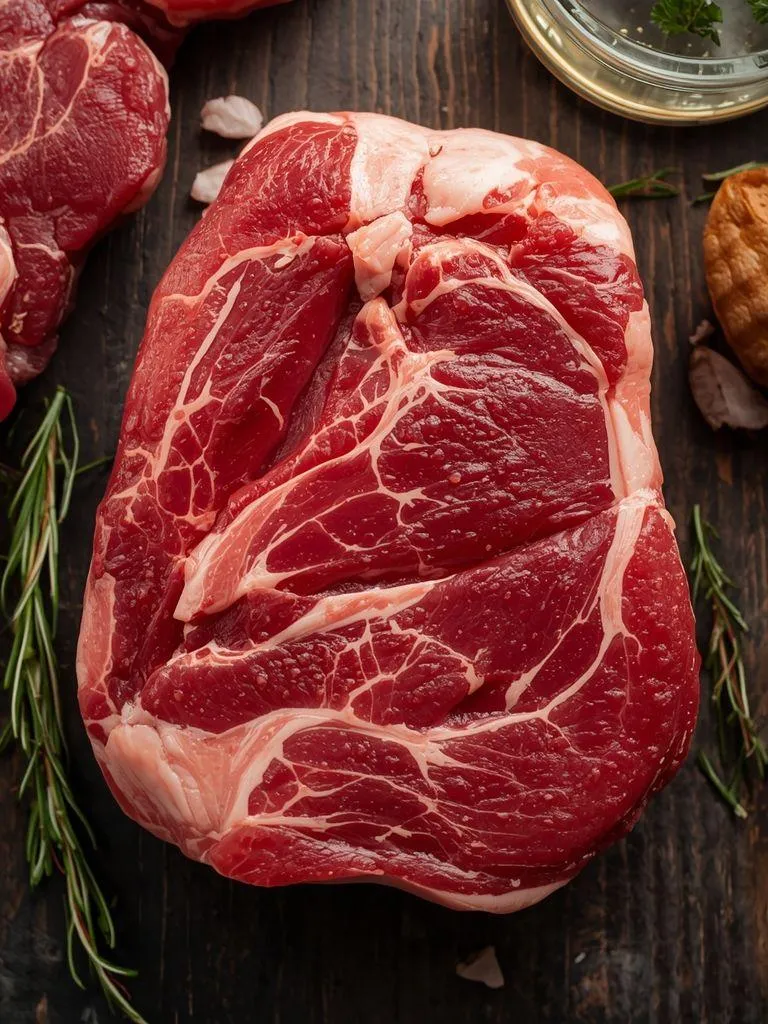- Max Müller
- October 24, 2025
- 10min.
- Report
A Meat-Based Diet or Dietary Approach Focusing Solely on Animal Products May Be Advantageous to Health
Table of Contents
1. The meat-based diet – fundamental postulates
The meat-based diet was formulated by Dr. Shawn Baker, an American orthopedist, surgeon, writer, and athlete. In 2019, he published a book titled The Carniove Diet, in which he describes the beneficial outcomes of the dietary regimen he created on human health. In his publication, the author shares his personal story about diets and demonstrates how significant benefits he derived from consuming exclusively animal-derived products over a span of 2.5 years. This diet excludes all carbohydrates entirely, and among the allowed foodstuffs, the author enumerates solely meat, occasional dairy in small amounts, eggs, animal fat, butter, and lard, whereas he suggests water and bone broth as beverages.2. Merits of the diet as per the author
According to the author, this diet aids in quicker fat burning and enhances the functioning of the cardiovascular, musculoskeletal, nervous, immune, digestive, and hormonal systems. He also asserts that his diet is beneficial in treating diabetes, addictions, skin issues, allergies, as well as neurodegenerative and mental disorders. The carnivore diet is described by Dr. Baker as perfect for everything (Sh. Baker 2019). However, this theory is primarily based on cases of the author's patients, not on available scientific research. It is therefore worth investigating the impact of this diet on human health based on available medical knowledge and verifying the reasonableness of applying such a dietary model.3. High Quantities of Red Meat Consumption and Cancer Risk
In the realm of available scientific research, there is no evidence to corroborate Dr. Baker's theory. Although scientists do not endorse a meat-only dietary model, numerous studies have been published confirming the negative impact of excessive consumption of animal products on human health. This type of food is rich in saturated fatty acids, protein, and cholesterol, but contains no fiber and many minerals and vitamins. According to a meta-analysis of 148 studies published in 2021, the high intake of red meat (e.g., beef, pork, lamb, game, horse meat, lamb meat) and processed products based on it is associated with a significantly increased risk of breast, endometrial, colon, rectal, and lung cancer (M.S. Farvid et al., 2021).4. The peril of hyperuricemia development
A large consumption of products high in purines can bring about an increase in uric acid levels (so-called hyperuricemia), which can consequently result in a variety of diseases, including gout, characterized by episodes of intense pain and swelling of the affected joint (Z. Guła, M. Korkosz 2017). Studies have shown a correlation between a high intake of red meat and seafood with the occurrence of the aforementioned conditions and the exacerbation of their symptoms.5. Influence of cholesterol and fatty acids on human health
It has long been known that a high intake of saturated fatty acids and cholesterol (which are abundant in animal products) has negative effects on human health. It promotes the occurrence of cardiovascular diseases such as atherosclerosis, heart attack, stroke, which, according to WHO data, are the leading cause of death worldwide, including in Poland. It is important to note that vegetarians have a significantly lower risk of death from these diseases compared to people who normally eat meat (T. Huang et al., 2012). It is also worth mentioning that eggs influence cholesterol levels in the blood by increasing the total and so-called bad cholesterol (LDL), which correlates with the occurrence of circulatory disorders, especially in diabetics (Y. Li et al., 2013). Advocates of meat-rich diets argue that animal products are rich in vitamin B12, the deficiency of which can lead to an increased level of homocysteine and cause the occurrence of cardiovascular diseases. However, it is worth noting that in a typical diet (not vegan or vegetarian), there is no observed deficiency of this vitamin (K. Woo et al., 2014).6. Issue with Excessive Iron
There are two types of iron: non-heme and heme. The first of these is present in plant products such as legume seeds, pumpkin seeds, rice cumin, dried figs, or leafy green vegetables. The absorption from these sources is very low and is 1-10%, while the absorption of heme iron, present in animal products (especially offal), can be up to 50%. In our society, however, we are more likely to experience a deficiency of this ingredient, but it has been proven that its intake can be equally harmful to the body (A. Borkowska, J. Antosiewicz 2020). It has been observed that men with higher iron levels in the blood have a significantly higher risk of having a heart attack. In addition, a high concentration of this element is associated with increased insulin resistance, which can ultimately lead to type 2 diabetes (J.C. Fernandez-Cao et al. 2013; D. Basuli et al. 2014). It is also believed that people who regularly donate blood have a lower risk of developing cancer, which is due to the reduction of iron in the blood (S.V. Torti et al. 2018). In addition, studies conducted on athletes suggest that an excessive intake of iron can weaken the immune system and lead to more frequent infections (E.D. Weinberg 2009).7. What's the story with fiber?
A diet low in carbohydrates also does not provide fiber, which is a very important component for maintaining blood glucose levels and reducing the risk of type 2 diabetes. According to the guidelines, the requirement for fiber is < 5 g/day (M. Jarosz et al. 2020). Research has shown that fiber is extremely important for human health. A diet rich in fiber contributes to increasing tissue sensitivity to insulin and lowering blood sugar levels, which decreases the risk of diabetes type 2 (A. N. Reynolds et al., 2022). Fiber also has a positive effect on blood pressure and can help reduce body weight by influencing the feeling of satiety. Products rich in fiber typically have a lower energy density and a larger volume (K. E. Bach Knudsen et al., 2018). Increasing fiber intake can also contribute to reducing the overall inflammatory state in the body and strengthening the immune system (H. Woo et al., 2015). One of the most well-known effects of fiber is the prevention of constipation by supporting intestinal peristalsis and increasing stool volume (D. Oduro-Donkor et al., 2020). Fiber also plays an important role in maintaining a healthy gut microbiome, as dysbiosis in the digestive tract can lead to negative health effects, including autoimmune diseases, atopy, food intolerances, and depression (R. W. Morton et al., 2018).8. Excess protein in the diet and its consequences
The carnivorous diet, which is rich in protein, is a popular way of eating. It is believed that increased intake of this nutrient improves muscular synthesis in the body, which is often recommended for athletes and people with type 2 diabetes (to reduce carbohydrate intake). However, it has not been observed that this synthesis increases proportionally to the amount of protein in the diet – after a certain time, it does not increase further. (A. L. Kamper, S. Strandgaard 2017). However, it is worth noting that a high intake of this macronutrient can negatively affect the condition of patients with kidney failure or impaired kidney function. It is also often said that a high protein intake can negatively affect liver function, even in healthy individuals, although this has not been definitively confirmed (J. Silva 2014). A one-year study of overweight people did not find that excessive protein intake negatively affected liver function (Z. Li et al. 2010). Interestingly, animal studies have found that a diet with a higher protein and lower carbohydrate content reduces the amount of stored fat in the liver, which may help protect against non-alcoholic fatty liver disease (W. W. French et al. 2017). However, it should be noted that these studies were conducted on animal models and the amount of protein in the diet was not as high as in the carnivorous diet, so it is difficult to predict whether the same effect will be achieved in the case of the carnivorous diet.9. Missing nutrients and minerals
With elimination diets, the main issue is deficiencies. Given that it is a highly restrictive way of eating, potential components that may be missing include: vitamin C, B6, B1, or folic acid and potassium, magnesium, and calcium (unless the intake of protein is substantial, but according to the assumptions of the meat-eating diet, it should not be). There is also a lack of widely available antioxidant components, such as flavonoids. Therefore, it is absolutely crucial to plan the appropriate supplementation, ideally after consulting with a doctor (J. Reguła 2014).10. Carnivorous diet and weight loss
The diet that relies exclusively on meat consumption is highly restrictive, and its long-term maintenance is not a simple task. In such restrictions, the so-called yo-yo effect is very often observed. Indeed, at the beginning, body weight decreases rapidly and significantly, but mainly due to the loss of water from the body. This occurs because, in a situation of carbohydrate deficiency, the body releases glycogen stored in the liver and muscles, leading to increased fluid loss (F. Tettamanzi et al. 2021). After some time, the pace of weight loss slows down, leading to a decrease in motivation to maintain the diet and a return to old eating habits, as well as an increase in weight. Of course, this is not a rule, but without the development of healthy eating habits and education in this area, it is really difficult to speak of a lasting change.11. Benefits of a meat-rich diet
It is difficult to say. We can look for benefits from other types of diets, such as the ketogenic diet, Dukan, or Paleo. However, none of them completely exclude carbohydrates, and in any case the only source of energy is not animal products, so it is not possible to draw the right conclusions. Based on the aforementioned models, it can be assumed that by basing your diet on high-protein animal products (and thus cutting down on sugars) you can improve glycemic control and tissue sensitivity, which could help your body's insulin sensation by increasing your body fat or even preventing your body from eating fat. (T. P. Wycherley et al. 2012) Additionally, it has been confirmed that high-protein diets significantly increase the feeling of satiety through their action on the nervous system, resulting in a decrease in calorie intake and ultimately greater weight loss compared to normal protein diets. The effect of thermogenesis (this means the amount of energy the body has to use to digest a specific macronutrient) is also important. In the case of proteins, it is about three times more than in the case of carbohydrates and six times more than in the case of fat (U. Keller 2011). Interestingly, in rats, it has been observed that a high protein intake inhibits the appetite centers in the brain (so-called food intake centers) by reducing the sensitivity of the reward system, resulting in a smaller appetite (M. Journel et al. 2012). And here the potential benefits end.12. Concise Summary
Due to the lack of research on a dietary model based exclusively on animal products and existing evidence that high meat consumption is detrimental and may lead to adverse consequences, the carnivore diet is not recommended. Although this dietary regimen has its benefits as well, these do not outweigh its drawbacks, and its long-term application will not benefit the body. The optimal solution is to rely on the plate of healthy eating, which has been developed based on extensive scientific data and has had its safety and positive effects confirmed (K. Wolnicka 2020).












